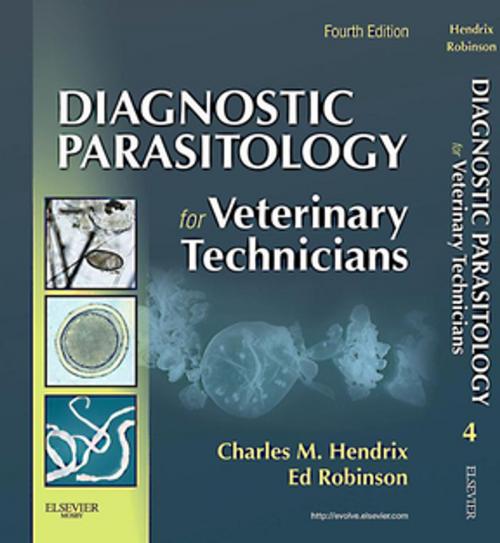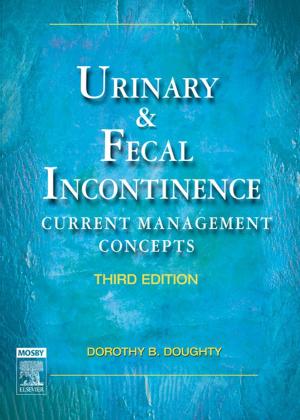Diagnostic Parasitology for Veterinary Technicians - E-Book
Nonfiction, Health & Well Being, Medical, Veterinary Medicine| Author: | Charles M. Hendrix, DVM, PhD, Ed Robinson, CVT | ISBN: | 9780323291255 |
| Publisher: | Elsevier Health Sciences | Publication: | April 14, 2014 |
| Imprint: | Mosby | Language: | English |
| Author: | Charles M. Hendrix, DVM, PhD, Ed Robinson, CVT |
| ISBN: | 9780323291255 |
| Publisher: | Elsevier Health Sciences |
| Publication: | April 14, 2014 |
| Imprint: | Mosby |
| Language: | English |
Covering dogs and cats, ruminants, horses, swine, birds, rabbits, laboratory animals, and fish, Diagnostic Parasitology for Veterinary Technicians, 4th Edition features clear and concise discussions of the most commonly encountered internal and external parasites. In full-color, with a convenient spiral binding, this resource offers step-by-step guidelines for collecting samples and performing lab procedures. Comprehensive terminology coverage familiarizes you with the language of parasitology for effective communication with other members of the veterinary team, and the enhanced life cycle coverage helps you educate clients about prevention and control strategies.
-
Clear and concise coverage of the most commonly encountered internal and external parasites provides an accessible, informative resource for veterinarians, technicians and students alike.
-
Full-color images of parasites ease your ability to recognize parasites in lab samples.
-
Appendix of parasites for each species shows their location and makes it easy to find discussions on every specific parasite.
-
Chapter on lab procedures offers step-by-step guidelines for gathering samples and performing lab procedures.
-
Emphasis on zoonotic potential of parasites helps you alert other health care workers and clients on ways to prevent transmission of a zoonotic parasite, condition, or syndrome from animals to humans.
-
Basic chapter on terminology familiarizes you with the language of parasitology for more effective communication with clients and colleagues.
-
Heartworm section offers insights on performing and interpreting heartworm diagnostic tests to help you recognize and treat this major parasite.
-
Additional tables of parasites – cross-referencing such categories as body systems affected, taxonomic grouping, host species, and location in host – ensure that you understand the countless ways of categorizing parasites.
-
Consistent presentation of information on individual parasites – including common name, size and location of adult, size of egg, and importance (such as disease condition caused by the parasite adult/egg) – helps you quickly locate vital data.
-
Detailed coverage of parasite life cycles includes additional life cycle drawings to help you easily communicate prevention and control strategies to clients.
-
New pictures of pseudoparasites (yeast cells, pollen grains, plant cells) help you recognize pseudoparasites and understand how they differ from parasites.
-
Expanded chapter on exotics offers more images and detailed discussions of the parasites that affect exotics animals.
-
Vet Tech Threads include chapter outlines, key terms, chapter quizzes, and Technician Notes, to help you focus on key concepts.
-
Online resources on Evolve include an image collection and electronic flash cards for a visual and interactive learning experience.
Covering dogs and cats, ruminants, horses, swine, birds, rabbits, laboratory animals, and fish, Diagnostic Parasitology for Veterinary Technicians, 4th Edition features clear and concise discussions of the most commonly encountered internal and external parasites. In full-color, with a convenient spiral binding, this resource offers step-by-step guidelines for collecting samples and performing lab procedures. Comprehensive terminology coverage familiarizes you with the language of parasitology for effective communication with other members of the veterinary team, and the enhanced life cycle coverage helps you educate clients about prevention and control strategies.
-
Clear and concise coverage of the most commonly encountered internal and external parasites provides an accessible, informative resource for veterinarians, technicians and students alike.
-
Full-color images of parasites ease your ability to recognize parasites in lab samples.
-
Appendix of parasites for each species shows their location and makes it easy to find discussions on every specific parasite.
-
Chapter on lab procedures offers step-by-step guidelines for gathering samples and performing lab procedures.
-
Emphasis on zoonotic potential of parasites helps you alert other health care workers and clients on ways to prevent transmission of a zoonotic parasite, condition, or syndrome from animals to humans.
-
Basic chapter on terminology familiarizes you with the language of parasitology for more effective communication with clients and colleagues.
-
Heartworm section offers insights on performing and interpreting heartworm diagnostic tests to help you recognize and treat this major parasite.
-
Additional tables of parasites – cross-referencing such categories as body systems affected, taxonomic grouping, host species, and location in host – ensure that you understand the countless ways of categorizing parasites.
-
Consistent presentation of information on individual parasites – including common name, size and location of adult, size of egg, and importance (such as disease condition caused by the parasite adult/egg) – helps you quickly locate vital data.
-
Detailed coverage of parasite life cycles includes additional life cycle drawings to help you easily communicate prevention and control strategies to clients.
-
New pictures of pseudoparasites (yeast cells, pollen grains, plant cells) help you recognize pseudoparasites and understand how they differ from parasites.
-
Expanded chapter on exotics offers more images and detailed discussions of the parasites that affect exotics animals.
-
Vet Tech Threads include chapter outlines, key terms, chapter quizzes, and Technician Notes, to help you focus on key concepts.
-
Online resources on Evolve include an image collection and electronic flash cards for a visual and interactive learning experience.















